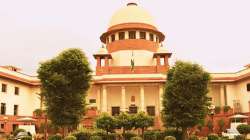Ayodhya case: SC allows Nirvani Akahara to file written note on moulding of relief
Both 'Nirmohi Akahara' and its rival 'Nirvani Akahara' are seeking right to manage and offer 'puja' at the birthplace of deity 'Ram Lalla Virajman' at the site.

The Supreme Court on Tuesday allowed 'Nirvani Akahara', one of the Hindu parties in the decades-old case of Ram Janmbhoomi-Babri Masjid land dispute in Ayodhya, to file a written note seeking the "right to manage worship of the deity" as 'shebait' (devotee) at the site.
A counsel for 'Nirvani Akahara' mentioned the matter before a bench headed by Chief Justice Ranjan Gogoi and said his client "miscalculated" the 3-day time granted by the court for filing the written note on moulding of relief -- narrowing down the issues raised during the hearing -- and was now seeking the nod for filing it with the apex court's registry.
"You file it now," the bench, which also comprised Justices S A Bobde and S A Nazeer, told senior advocate Jaideep Gupta who was representing 'Nirvani Akhara'.
Both 'Nirmohi Akahara' and its rival 'Nirvani Akahara' are seeking right to manage and offer 'puja' at the birthplace of deity 'Ram Lalla Virajman' at the site.
While 'Nirmohi Akahara' had filed a lawsuit in 1959 seeking the right as 'shebait', 'Nirvani Akahara' has been made a party (defendant) in two separate lawsuits filed by Uttar Pradesh Sunni Central Wakf Board and deity 'Ram Lalla', through next friend Deoki Nandan Agrwal, in 1961 and 1989 respectively.
"It is humbly submitted that none of the parties (amongst) Hindus in the aforementioned suits have made claims...for shebaitship right and are instead claiming either as the owner or as a next friend (of deity) ...and thereby seeking to build a temple at the disputed structure.
"Hence the 'pujari' and/or 'shebaitship rights of the present respondent (Nirvani Akahara) remained unchallenged...," the written note said.
The Akahara has sought a direction that it be handed over the "right to manage the worship of the deity of the Ram Janambhoomi/disputed structure as the 'pujari' and/or 'shebait' of the deity".
During the hearing, it had said that Mahant Abhiram Das, now deceased, of Nirvani Akahara was the priest at the site in 1949 and he was also made an accused in the FIR lodged for alleged placing of idols below the central dome of the disputed site on the intervening night of December 22-23, 1949. Now his 'chela' Dharam Das is the priest, it had added.
Earlier, the Muslim parties, including the Sunni Wakf Board, had filed the written note on moulding of relief in Supreme Court and had said the verdict in the Ayodhya land dispute case will impact "future generations" and have "consequences" for the country's polity.
"The decision by this court, whichever way it goes, will impact future generations. It will also have consequences for the polity of this country. This court's decision may impact the minds of millions who are citizens of this country and who believe in constitutional values embraced by all when India was declared a republic on January 26, 1950," said the note prepared by senior lawyer Rajeev Dhavan, appearing for the Muslim parties.
The Constitution bench had reserved the verdict on October 16 after concluding the 40-day-long hearing in the politically sensitive land dispute case and had asked the litigating parties to submit their written note within three days on "moulding of reliefs" so that the court can narrow down the issues needed to be adjudicated upon in the vexatious issue.
On Saturday, several Hindu parties had filed their written submissions in the Supreme Court with the counsel for the deity 'Ram Lalla' asserting that Hindus have been worshipping at the disputed area "since time immemorial" and the birthplace of the Lord Ram is "non-negotiable".
Besides the deity, other Hindu parties -- Nirmohi Akhara, All India Hindu Mahasabha and devotee Visharad -- had filed their written notes on Saturday in this case.
The high voltage hearing in the Ram Janambhoomi-Babri Masjid dispute involving 2.77 acres of land is the second longest after the landmark Keshvanand Bharti case in 1973 during which the proceedings for propounding the doctrine of basic structure of the Constitution continued for 68 days.
The hearing on the validity of Aadhaar scheme lasted for 38 days in the top court which came into existence in 1950.
Also Read: Ayodhya: SC allows Muslim parties to bring on its record written note
Also Read: Ayodhya dispute: Muslim litigants not to build mosque if verdict in favour